Many people choose to learn different languages for multiple purposes like travel, work, education and cultural enjoyment. Also, new cognitive skills open new opportunities and help you connect with other parts of the world. However, adopting the right language learning resources makes a significant difference and speeds up learning. Therefore, this article reviews the 10 best language learning apps with their pros and cons, making the learning process fun.
10 Top Language Learning Apps
In this section, we’ll explore the top 10 language learning apps that are transforming how people master new languages. From interactive lessons to real-world practice, these apps offer a range of features designed to make learning engaging and effective. Let’s dive in and discover the best options for enhancing your language skills.
1. Babbel (Android | iOS)
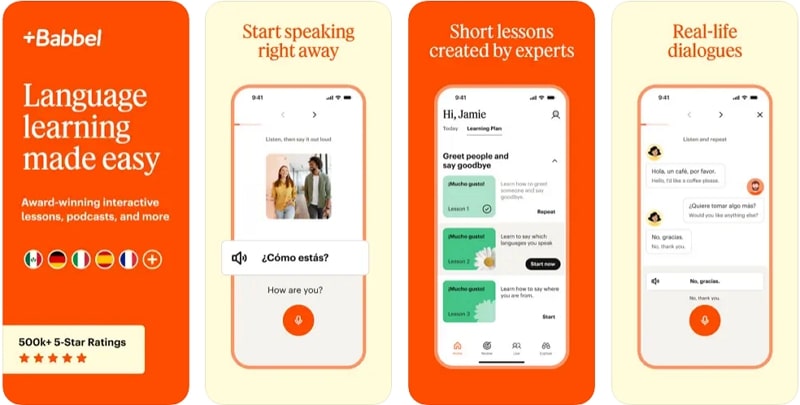
It is a language-learning app with clear and structured lessons on real-life conversations. Babbel has advanced speech recognition technology that helps with pronunciation and provides courses in 14 languages. Additionally, the app allows offline access to enable learning without an internet connection. As it offers help with all 4 fundamental communication skills, that is why it is the best app to learn a language.
Pros
- It has short and manageable lessons.
- Offers cultural insights into the targeted language.
- Keeps track of your performance over time.
- Enjoy learning without ads.
- Additional features like Podcasts and magazines to explore.
- Besides, it offers discounts for students and educators.
Cons
- The free content is limited.
- Moreover, not all languages have the same depth of content.
- Additionally, it lacks options for live tutoring.
2. Duolingo (Android | iOS)
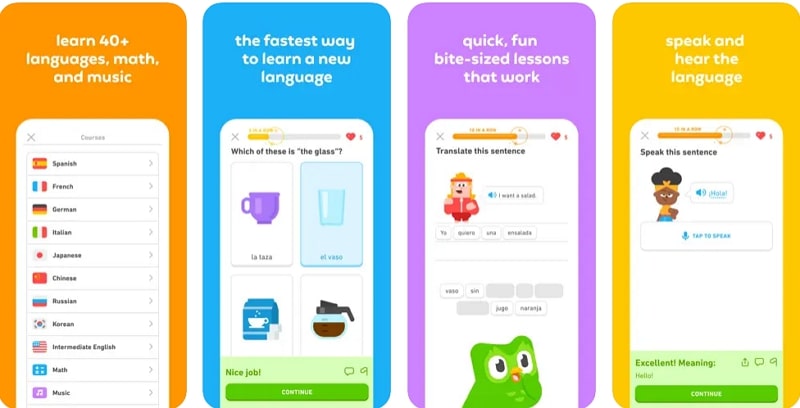
To make learning more engaging, this app has designed lessons in the form of games. Additionally, Duolingo maintains the daily streaks that keep you motivated to learn on a daily basis. The conversations are occasion-based, like dates or parties, making it a great free language-learning app. Besides, you can take an English test to check your level of the language.
Pros
- Allows free access to a wide range of content.
- Offers active community support.
- Furthermore, teaching methods are research-based.
- Adds interactive stories to learn with context.
- Besides, develops growth in teachers with different programs.
- Gives its users points and unlocks new levels according to progress.
Cons
- Content may be too basic for advanced learners.
- It also has a limited focus on speaking skills.
- Quality is inconsistent across different courses.
3. Memrise (Android | iOS)
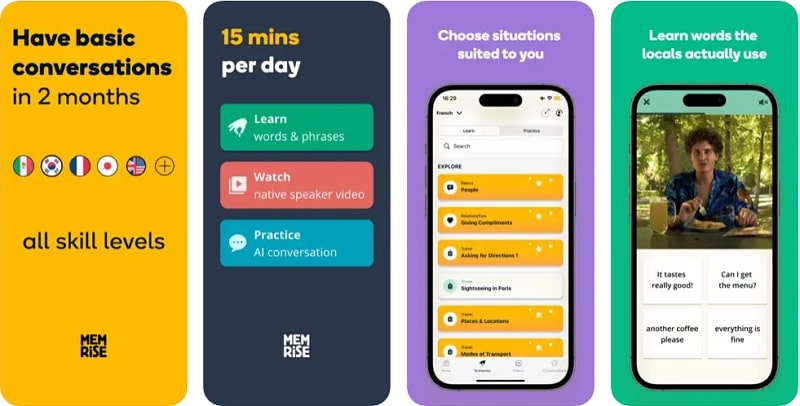
It utilizes video clips of native speakers to help learners get used to real-life scenarios. Not only will you learn a language but also speak it like a native. Additionally, Memrise uses spaced repetition to help its users with the memory retention process. With courses for more than 30 languages, you can also call it one of the best free language learning apps.
Pros
- Suitable for learners of multiple levels.
- Provides AI feedback on your progress.
- Additionally, it is focused on vocabulary.
- Has visual learning aids like videos and charts.
- Users can customize their learning path.
- Besides, it offers user-generated content for niche languages.
Cons
- Premium subscription is required to use all features
- Less focus on grammar and writing skills.
- Besides, the interface can be complex for new users.
4. Busuu (Android | iOS)
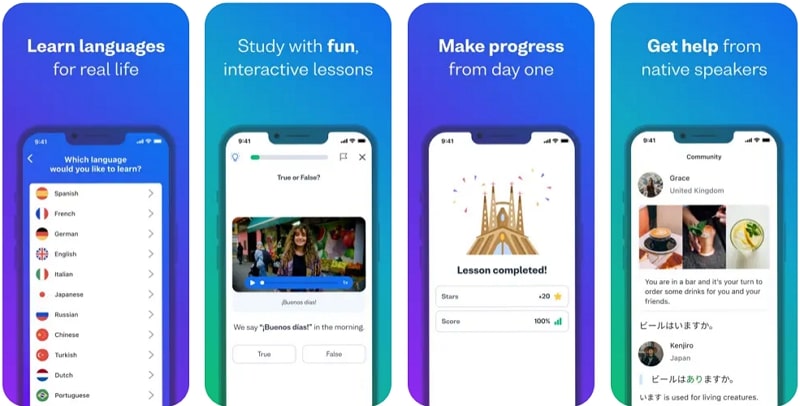
With this tool, you can learn new languages with a focus on interaction with native speakers. Furthermore, Busuu provides feedback from native speakers that will significantly help you while learning. It also allows the Japanese to learn from Mangas, which is an excellent example of fun learning. Moreover, it is one of the language learning apps for professionals as it has an international language learner community.
Pros
- The lessons are focused on grammar to improve your writing skills.
- Additionally, you get official certificates when you complete the course.
- In the community, you get feedback from the experts that can significantly help you.
- The app also has an offline mode to use it without the internet.
- Besides, you get to set your goals and track your progress.
- You get to enjoy personalized study plans according to your needs.
Cons
- Has fewer language options to learn compared to the competitors.
- Some of its exercises can feel repetitive to the learners.
- Besides, it does not have advanced materials for high-level learners.
5. Lingoda (Android)
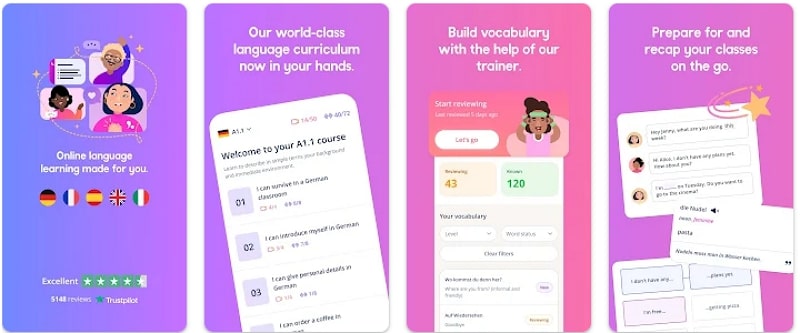
To help learners with the new language, it offers live, online classes where teachers are native speakers. It is really up to the users to tell what the best language learning app is, but Lingoda provides both group and private lessons for the learners. Their community support and classes are available 24 hours, so you can enroll according to your availability.
Pros
- The class sizes are small for more personalized learning, usually around 2-4 members.
- Also, you will get access to learning materials and resources.
- Free trial classes are available for interested ones to check the environment.
- An interactive environment where you can clear confusion to boost learning.
- Moreover, the instructors are professional and experienced.
- The curriculum is well-balanced for all kinds to cover all four basic language skills.
Cons
- The cost is higher compared to other similar apps in the market.
- Besides, you won’t have offline access to lessons.
- You have to commit to scheduled class times like a real class.
6. Drops (Android | iOS)
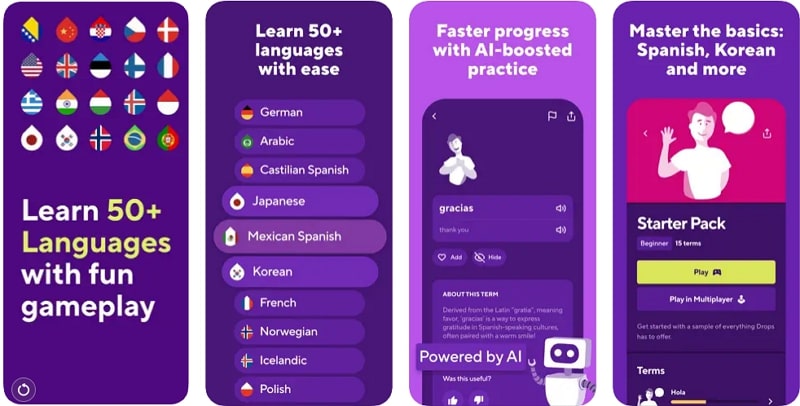
It is a vocabulary-focused app that uses visual associations to help learners with new words. Drops is on the list of the best free apps for learning languages because it covers over 50 languages for enthusiasts. Additionally, it has a minimalist design to save the learners from distractions while learning. The length of the lessons is designed to be completed within just 5 minutes, which is excellent for busy learners.
Pros
- Has a free version with basic features for learning.
- Allows you to learn different dialects like British English and American English.
- Has multiplayer fun learning games that you can play with friends.
- Moreover, the premium version allows an ad-free experience for the learners.
- There is no time limit to using this app, and you can use it as much as you want.
- As it is vocab-focused, you get to learn more than 3,000 words, which are professionally curated.
Cons
- The app puts little focus on grammar and sentence structure.
- Furthermore, it is not great for advanced language learners who are seeking in-depth content.
- It does not have speaking and pronunciation practice for those who love spoken.
7. DuoCards (Android | iOS)
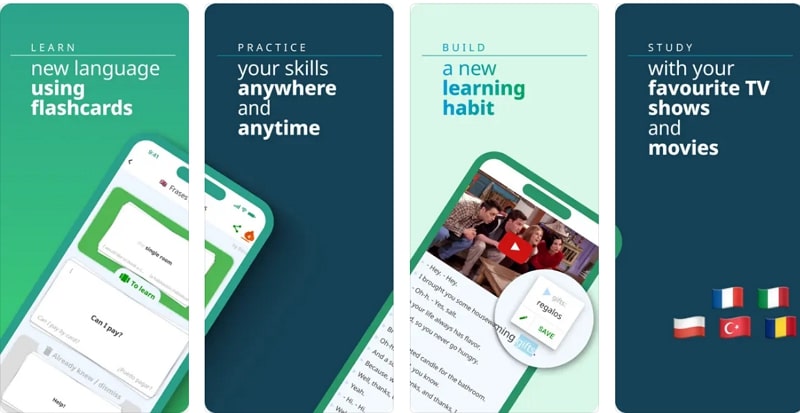
This app combines basic flashcard-based learning with authentic content from native speakers. DuoCards lets you learn with the help of videos, articles, and quizzes. Also, it has an integrated translator, and you can save custom words from your phone or browser extension. It is one of the good language learning apps and lets you improve the vocabulary of a language you already know.
Pros
- It integrates authentic content so you can learn while knowing the context.
- The users can customize the flashcards for their individual needs.
- Furthermore, it is equally suited for beginners and advanced-level learners.
- Guess mode allows you to evaluate your skill in a particular language.
- Not just words, you can read foreign language articles to learn it better.
- Its video language courses will help you learn a new language easily.
Cons
- A paid subscription is required to avail itself of advanced features.
- Does not have structured lesson plans.
- The quality of user-generated content may not always be great.
8. Lingvist (Android | iOS)
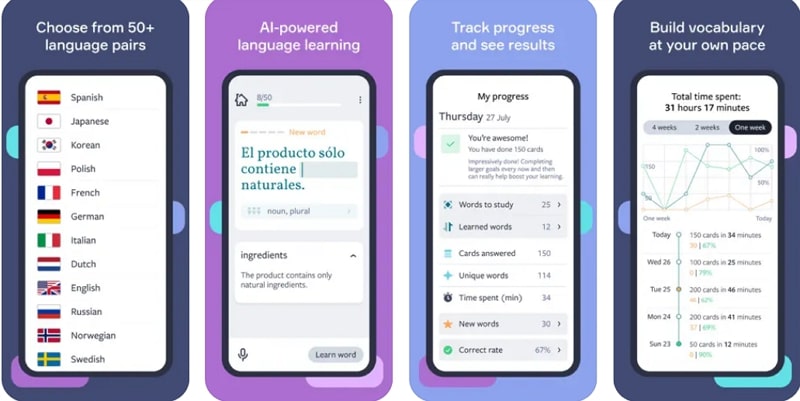
The lessons are made according to the individual progress of the individual with the use of AI. Lingvist, one of the top language learning apps, uses real-life sentences to know the context of different scenarios. Besides, it has smart algorithms that adapt to your levels and track statistics. You can also import an article or a topic to help you learn the language with a focus on specific content.
Pros
- Helps users with foreign language exams such as DALF for French, in addition to basic learning.
- Offers targeted grammar exercises to help in the practical application of grammatical rules.
- Moreover, audio from native speakers helps you improve your listening skills.
- Let’s monitor your learning statistics, including words learned and time spent on the app.
- Has an initial placement test to know your level of language.
- Its AI’s spaced repetition algorithm also helps you get over your mistakes.
Cons
- It is not ideal for complete beginners who have just started learning a language.
- Has limited speaking exercises that can hinder communication skills.
- Does not have a platform for interaction with others that limits collaborative opportunities.
9. Immerse (Android | iOS)
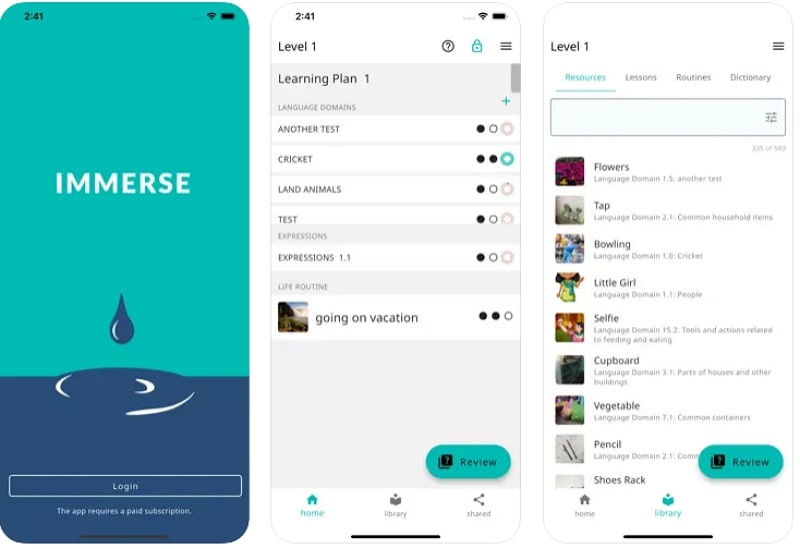
This virtual reality language learning platform for practicing languages is one of the good language learning apps. Immerse also allows users to experience scenarios such as shopping or dining via VR to take the learning to a new level. Moreover, it focuses on the spoken fluency of the learners by simulating the real world. Likewise, it has over 40 environments where you can learn a language with the help of teachers.
Pros
- Engagement of multiple senses helps in memory retention for the learners.
- With game nights and conversation groups, users can interact with the community.
- To prepare for a lesson, it allows practice activities.
- Also, this innovative approach appeals to learners who are interested in technology.
- It can reduce the anxiety of language learning by simulating real interactions.
- Moreover, interactive activities help in improving pronunciation.
Cons
- Requires VR equipment to learn, which can be costly.
- Additionally, it may cause motion sickness in some users.
- It is not suitable for learners who are used to traditional methods of learning.
10. Pimsleur (Android | iOS)
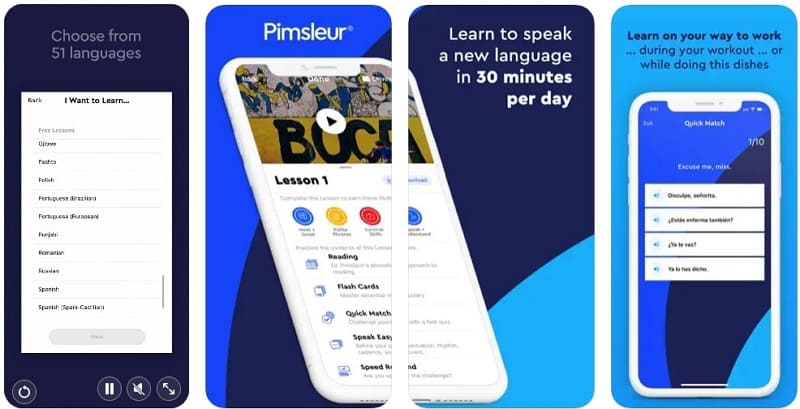
This best app to learn a language uses the Pimsleur Method, which emphasizes graduated interval recall and anticipation. It is an audio-based learning app that focuses on listening and speaking skills. Moreover, the lessons are usually 30 minutes long and are structured for daily base learning. It also offers learning courses for over 50 languages, and you can use it via mobile or desktop.
Pros
- Suitable for auditory learners who prefer to learn via listening and speaking.
- After downloading lessons, no internet connection is needed
- The learning method is a proven method that has been used for over a decade.
- Additionally, learning is organic through conversations, just like the first language.
- Graduated interval recall schedule moves your learnings from short-term memory to long-term memory.
- Moreover, anticipating enhances your brain’s capacity to learn.
Cons
- Has a limited focus on reading and writing skills.
- Lacks interactive or gamified elements which make learning fun.
- The cost is higher compared to some other language-learning apps.
How to Create Your Own Language Learning App With ZEGOCLOUD?
Let’s talk about a platform that can provide you with the APIs of all the features necessary for building a language learning app. Its ZEGOCLOUD offers robust video call SDKs to bring direct calls and group calls into your app. You can invite up to 10000 participants in a single call. Additionally, you can enjoy highly low-latency videos and audio with 300ms on average.
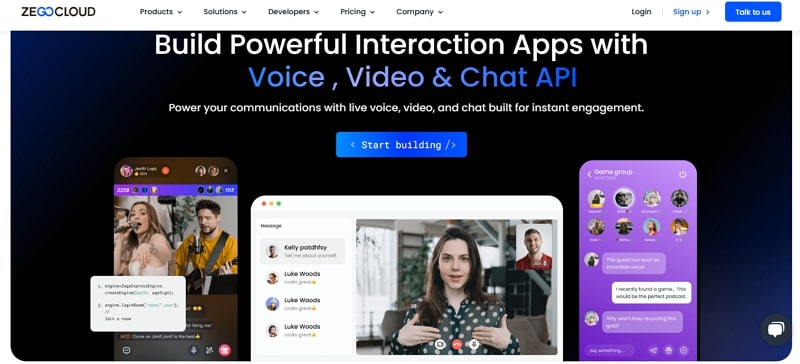
Moreover, you can leverage its voice call APIs that support AI noise reduction. To make your app the best language learning app, you can add features such as call invitations and fun audio effects. Some learners may not be comfortable with audio or video calls but are good at texting. Therefore, the platform allows in-app chat APIs to chat one-on-one with someone, send push notifications, or create group chats.
Additionally, live streaming facilities for virtual classrooms and live lessons allow for a dynamic environment for language learners. This platform allows SDKs for Live Streaming and provides features such as screen-sharing and live interactions. Some activities may involve fun games that you can enable by features like Streamer Battles. Plus, it allows you to record the live stream of the language lessons and save them for sharing or review purposes.
Conclusion
In conclusion, the guide explored some of the best language learning apps that are helping learners with different techniques. Inspired by these apps, you can create your own learning app via platforms like ZEGOCLOUD APIs and SDKs. Through its robust SDKs for video calls, voice calls, and in-app chat, you can enhance your learning experience and stand out in the industry.
Read more:
FAQ
Q1: What is the #1 best language learning app?
The best language learning app depends on your preferences. Duolingo is a popular choice for beginners with its gamified and user-friendly interface. For a more structured and comprehensive approach, Babbel is also a top contender.
Q2: Is Duolingo or Babbel better?
Duolingo is ideal for beginners, offering free, short lessons in a fun format. Babbel, on the other hand, is better for those looking for more structured, conversation-focused lessons and is a paid option with more in-depth material.
Q3: Is Babbel or Pimsleur better?
Babbel offers a structured, grammar-focused curriculum that’s great for learning vocabulary and sentence structure. Pimsleur is better for those who want to focus on listening and speaking skills with an immersive, audio-based approach.
Q4: Is there a better app than Duolingo?
Depending on your learning goals, Babbel offers more detailed lessons, while Pimsleur excels at audio-based learning. For a more immersive experience, Rosetta Stone or Busuu could also be good alternatives.
Let’s Build APP Together
Start building with real-time video, voice & chat SDK for apps today!










